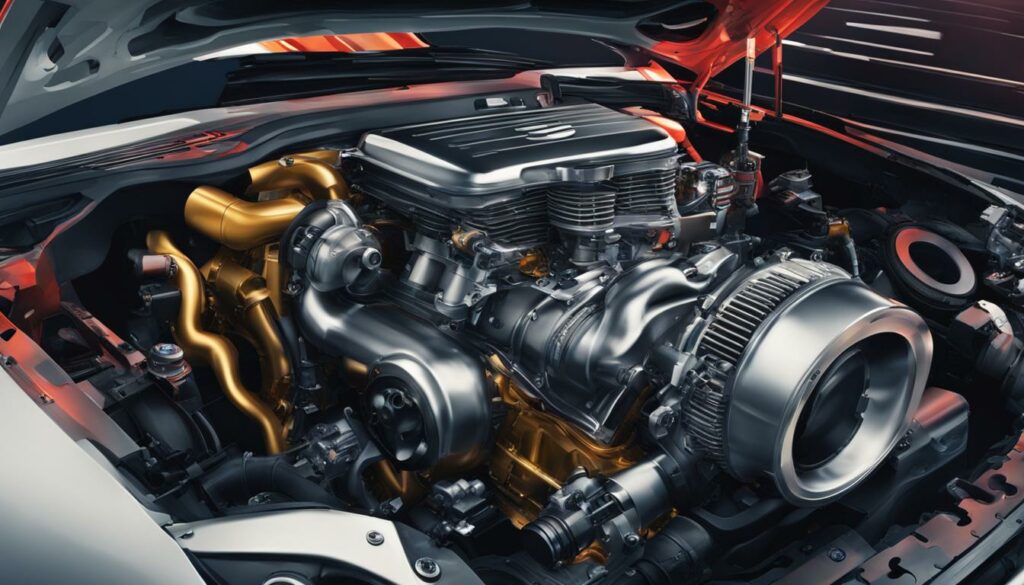Have you ever asked yourself, “Why does my car make clicking sounds when I turn?” You’re not alone. Many drivers experience this strange noise when turning the steering wheel, and it can be both annoying and concerning. In this section, we’ll explore the potential causes of this issue and provide you with quick and easy solutions to resolve it.
Key Takeaways:
- Clicking sounds when turning the steering wheel can indicate a problem in the car’s steering system.
- The sound can be caused by worn-out or damaged CV joints and axles, binding, or lack of proper lubrication within the steering system.
- If left unaddressed, the clicking noise could lead to further damage and potentially dangerous situations on the road.
- Regular maintenance and inspections can help prevent and address potential issues with your car’s steering system.
- When in doubt, it’s important to consult a trusted mechanic or professional for advice.

Understanding the Clicking Noise
Before delving into the possible causes of the clicking noise when turning your car, let’s first understand what the noise means. Clicking sounds may indicate several issues, including:
- Worn-out or damaged CV joints or axles
- Binding or lack of proper lubrication in the steering system
- Worn-out components that require replacement
Now, let’s take a closer look at these possible causes and how to address them.
Checking CV Joints and Axles
If you’re hearing clicking sounds when you’re turning your car’s steering wheel, one of the things you should check for is a worn-out or damaged CV joint or axle. The CV joint, also known as the constant velocity joint, is responsible for transmitting torque from the transmission to the wheels. Meanwhile, the axle connects the wheels to the transmission and provides stability to the vehicle.
Over time, the protective boots covering the CV joints and axles may become damaged, allowing dirt and debris to enter. This can cause wear and tear on the components, leading to clicking noises when turning. The good news is that inspecting and addressing potential issues with these parts is relatively easy.
| Signs of CV Joint or Axle Problems | What To Do |
|---|---|
| Clicking or popping noises when turning | Inspect the CV joint or axle for signs of damage or wear and tear. Replace the component if necessary. |
| Grease or debris on the inside edge of the tire | Inspect the CV joint or axle boots for damage. If damaged, replace the boots or the entire CV joint or axle. |
| Vibration or shuddering during acceleration | Inspect the CV joint or axle for damage. If damaged, replace the component. |
Be sure to address any CV joint or axle problems promptly to avoid further damage to your car’s steering system. In some cases, you may be able to replace just the damaged boot rather than the entire component, but be sure to consult with a professional mechanic to ensure a proper and safe repair.
Addressing Binding and Lubrication Problems
If your car is clicking when you turn, the issue may stem from binding or lack of proper lubrication in the steering system. Binding is essentially a friction issue that occurs when the moving parts of the steering system grind against one another, leading to an unpleasant noise. Regular lubrication of the steering components ensures that the parts move smoothly and without creating noise or resistance.
If you’re experiencing clicking noises when turning, it may be time to inspect the steering system for any signs of binding or inadequate lubrication. One way to check for binding is to examine the different steering components for any signs of wear and rust. You can also try turning your wheels while the car is stationary to see if there are any stiff or rough spots.
Tip: When examining your steering system, pay special attention to the tie rods, steering rack, and ball joints. These components are often responsible for binding issues that result in clicking noises.
If you suspect that the steering system is improperly lubricated, add lubricant to the steering rack and other steering components, following the manufacturer’s recommendations. Adding too much or the wrong type of lubricant can cause more harm than good, so don’t use just any product you have on hand. It’s best to consult your owner’s manual for guidance on the proper type and amount of lubricant to use.
If binding or lack of proper lubrication is the issue causing the clicking noise when you turn, addressing the problem quickly can prevent further damage to your vehicle.

Conclusion
Now that you understand the potential causes and solutions for the clicking noise when turning your car, you can confidently tackle this issue. Remember, delaying repairs could lead to further damage, so address any concerns promptly.
Whether it’s a worn-out CV joint or axle, binding or lack of proper lubrication within the steering system, or a component that requires replacement, there are steps you can take to get back on the road smoothly.
Inspect and address potential issues, lubricate your steering system regularly, and consider replacement options when necessary. With these quick and easy solutions, you’ll be able to enjoy a peaceful driving experience once again without the annoyance of a clicking noise when turning your steering wheel.


